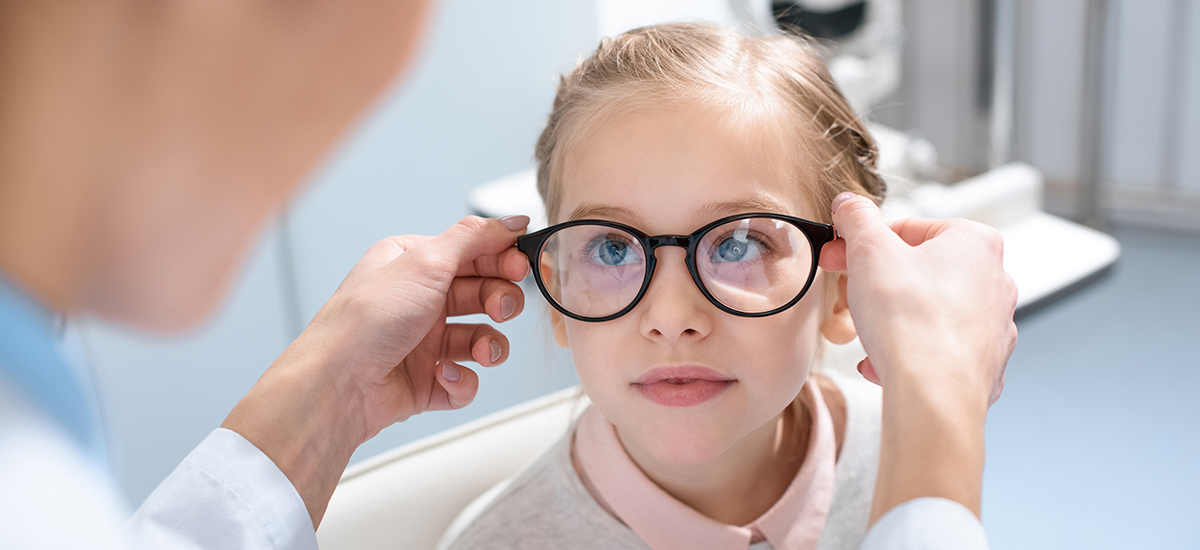Is My Child’s Vision Getting Worse?

Has your child been having trouble seeing ever since they started school? Do you suspect they might need glasses? If so, have no fear!
Today, we’ll cover one of the top questions eye doctors get asked (“Is my child’s vision getting worse?”) so that you know what to look for and what steps you can take. Let’s get started!
Is my child’s vision getting worse?
Wondering if your child’s vision is getting worse is normal, especially if your child is having vision problems or hasn’t had an eye exam in a while. Keep reading to see what is normal for kids and when you should be concerned.
What is the normal vision for a child?
Since vision can change so quickly for children, a child may have normal vision in an eye exam but not 20/20 vision acuity. Visual acuity is the sharpness of an image that is 20 feet away.
During your child’s eye exam, an optometrist will check your child’s eye coordination and peripheral vision. They will also perform other tests to see how your child’s eyes perform at different angles and distances.
According to Prevent Blindness, it’d be a good idea for your child to meet with one of For Eyes’ Independent Doctors of Optometry in the following circumstances:
- Your child’s visual acuity is less than 20/50 between ages 3 to 4.
- Your child’s visual acuity is less than 20/40 between ages 4 to 6.
Fun Fact: A preschooler with 20/30 vision might be considered to have great eyesight. That’s because their vision may develop naturally into 20/20 by first grade. It is important to discuss visual acuity and what is “normal” with your child’ optometrist.
What are some of the early warning signs of vision problems in children?
If you wonder whether your child has eyesight deterioration or if you are curious about how to tell if your child needs glasses, ask yourself:
- Is your child complaining of blurry vision in one eye or both eyes?
- Is your child constantly rubbing their eyes?
- Is your child experiencing light sensitivity?
- Does your child have trouble concentrating?
- Has your child been squinting more than usual?
- Are your child’s eyes red or teary?
If your child has shown vision loss symptoms such as these, it is time to take them in for a comprehensive eye exam. This exam can tell the optometrist whether your child’s vision is getting worse and what you can do about it.
What causes eyesight to get worse in kids?
Many factors can contribute to worsening eyesight in children, including an increased use of digital devices (more on this below) and increased pressure on their eyes once they start school.
For instance, the text is smaller in grade school books, and kids have to read more than usual. That, combined with homework, can take a big toll on children’s eyes.
Are video games and screen time causing my child’s vision to get worse?
After using a digital device, according to the American Optometric Association, 80 percent of children say that they experience blurry, fatigued, and itchy eyes. And at least 18 percent of children spend time on screens for at least seven hours per day.
Playing video games and using other digital screens at close range can also lead to symptoms of nearsightedness. If your child has any symptoms of digital eye strain, it could be because they have spent excess time in front of the screen.
Limiting time on screens can be helpful when it comes to video games and mobile devices. Also, ensure that your child rests their eyes after spending extended periods looking at a screen. It’s also important to keep devices at a proper distance away from your child’s eyes.
How quickly can a child’s vision change? It can change in as little as 6 to 12 months, which is why an annual eye examination is important. Always alert your child’s eye doctor about sudden vision changes in your child.
How can I prevent my children’s eyesight from getting worse?
There are many ways to protect your kids’ eyesight, including the following:
#1: Encourage your child to spend time outdoors.
Even screen time is okay in moderation. However, getting your kids outside (better yet, play with them!) is a great way to support healthy eyesight and decrease their chances of nearsightedness.
#2: Get them glasses if needed.
If your child shows signs of needing glasses, it’s important to schedule an appointment with their pediatric eye doctor right away. That way, they can get the prescription they need, which can keep them from squinting or overexerting their eyes.
Summary: Is my child’s vision deteriorating?
Have you been asking yourself, “Is my child’s vision getting worse?” Keep in mind the symptoms of child eyesight deterioration so that you can alert their eye doctor. Also, consider how much screen time your child is getting.
Here’s how to know if your child’s vision is getting worse or if your child may need glasses:
- Your child is experiencing blurry vision or is rubbing their eyes a lot.
- Your child spends more than an hour a day on digital devices.
This blog was originally published on Month Day, Year, and expanded in August 2022.
Book your child’s eye exam at For Eyes.
Have you arranged your child’s annual comprehensive eye exam? Schedule an appointment with a friendly Independent Doctor of Optometry at your local For Eyes today.
Book your eye exam at For Eyes
Have you arranged your child’s annual comprehensive eye exam? Schedule an appointment with a friendly Independent Doctor of Optometry at your local For Eyes today.







